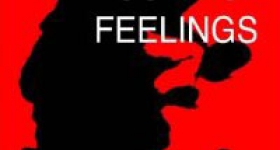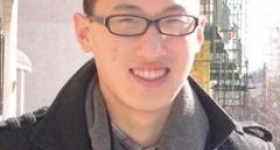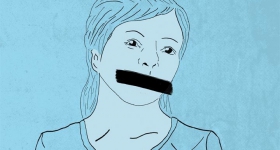Today's post is number three of a five-part series running every Thursday until Jan 6. First installment here.
Part 3
- Tuesday, March 29
There is a breakfast call at around 7 a.m., but I ask my roommate for the time and decline the meal, telling the staff that I don’t eat breakfast. By 8 a.m. I am up though, because it counts against you to sleep the day away. There are activities, and a patient's attendance or absence is recorded. Shampoo and conditioner are available on request, dispensed in tiny plastic pill-cups, puddled clear and fluorescent blue. There is no lock on the bathroom door, and no foot towel, so out of the shower I step on my hospital socks from the night before, but then put them away in my drawer, not sure if I might have to use them again.
I am ready soon, and then unsure what to do. My roommate Joanne is the only person I know to speak to, having been introduced to her last night. She wears her blond hair in two braids, and a cast on her right arm where she slit her wrist and ended up also fracturing her fingers in a fall. So matter-of-fact, Joanne is almost upbeat about the history that brought her here -- drunk mother, dead father, alcohol problem; she was piss drunk, she says, and suddenly she wanted to die. But her hold is over, she says, and maybe she’ll get out today. Selfishly I hope not; no one else seems sane. Throughout the morning, in moments of lull, there are requests from staff for tests: temperature, blood pressure, pulse. They take blood and ask for a urine sample. I comply readily, suspecting that my almost impudent physical health will reflect well on my mental health, and because the contact gives me a chance to convey myself. In even the slightest encounters with staff I am polite to a fault, light of voice, measured. At no point should anyone suspect that I do belong here.
I have been advised to track down my social worker in the morning, and am relieved when Wayne, a tall man sporting large brown mustache, finds me and brings me to a table with two chairs set up in the hallway (a kind of consultation corner, it turns out). This is the third time I have gone over my story. Refinements: I incorporate the earlier doctor's advisement that I need to think seriously about my unconscious impulses, in order to signal that I am willing to listen to advice, not making light of the situation. It works well: allays fears, echoes the cultural wisdom here. I consider telling the social worker about the incident from the night before, because its awfulness is oppressive and I want someone to lift it from me. But I do not have the luxury of confidences here. If anything, the African doctor has taught me that the staff are to be managed, not trusted -- that their interests are not necessarily to protect mine.
So instead I ask Wayne only whether in fact my records here can wreak havoc on job prospects and the like, in part to evaluate the truth of that man’s intimidation tactics, and in part to convey my concern for my future. He responds in the affirmative, that who knows what people can dig up if they’re inclined to; it’s just a question of how determined they are to find out. This is prickly but vague and still unsatisfactory to me. I will keep asking. Wrapping up, Wayne is sympathetic but not encouraging regarding my chances for release today. He is eager to speak to my sister to gather what they oddly call “collateral,” comprising something like corroboration and assurance from the family of my safety. We leave voicemails asking her to call, but she is on the plane to Hawaii now, and can’t be reached. It remains for the doctor to decide on my condition, and for me to await his arrival. There is no set time, only the assurance that each patient must be seen by her doctor once a day.
When we are done I head back and stumble onto some kind of morning meeting which has started in the main sitting area of the big room. Social workers, nurses and patients are gathered on chairs and sofas around the coffee table, talking loosely about the scheduled activities for the day. There is a dry-erase board on the wall with the timetable, but I don’t notice it until later and remain vague about how the days work in here for a while after. I’m glad to see Chris, who is the closest thing to old friends I have here: I had bidden him and his wife good luck when he went in yesterday evening. When the meeting lets out some of us gather around a cart with additional grooming supplies, and I am glad to get a bottle of mouthwash, plus use of an aerosol deodorant spray. I get a scoop of Noxema, and thinking industrial strength cleanser, apply it to my face with some trepidation. There is no saline solution, and my contacts have been sucked to my eyeballs since yesterday morning.
Next is OT, or Occupational Therapy, a strange name (I think at first) for what boils down to an assortment of games and diversions, not in the least vocationally oriented. But in fact the name is not misleading, just sardonically apt: they are activities aimed at keeping crazy people occupied. The activities are optional and Joanne doesn’t go; she only goes to the ‘talking sessions,’ she says. Feeling like a model minority, I let myself get rounded up.
The first OT session of the day is designated “Arts and Crafts” -- an hour slot in a special room (otherwise kept locked) during which patients have access to colored paper, paints, markers, pastels, pre-fab wood blocks and plastic ornaments, pages photocopied from coloring books and, as I find out the next day, make-up. Watching psych patients paint their nails and apply blush is an exercise in non-commentary. OT has something of the elementary school art class, but there is no single guided activity, and in art class children are encouraged to make things from scratch. Here projects need to be fast, because if people are lucky they will barely have time to finish. I have verbally ‘contracted’ with the OT nurse that I will hurt neither myself nor anyone else with the two-inch blunted child’s scissors I have been entrusted with, because I have decided to make tissue paper carnations -- acutely aware that they are something my mother taught me, and sure that somewhere here is irony. I draw circular stencils and cut them out, trace them onto sheets of pale pink tissue paper and cut them out again. By the end of the hour I have made two flowers, including one for my roommate. Chris has been filling in a Native American eagle design with fat, bright Crayola markers; he leans over to look at a finished flower and pronounces it pretty.
Then it is 11:30, only a half hour until lunch, and yet it is like a screech pitched just beyond hearing, having nothing to do. How slowly a minute seeps by here, I can’t explain. It’s as if time is caught too, unwilling, and cannot pass. If only I could read, I think, but I need a book that makes me feel like my mind is not on hold, and none of the trash paperbacks, the magazines, or the programs on TV will do that. I decide to call someone to bring me a book, maybe some Renu, and that means deciding who will handle the news the way I need them to. I leave a message on Chulho’s cell phone, with the numbers here. My access to calls is restricted today, because the nurse will not let me use the white phone that dials 510 numbers at will -- else admittedly I would be calling home compulsively to check for messages, listen for signs of people who are looking for me. Being reprimanded from the phone (which I’d used freely the night before) makes me feel less human. As does not being able to go out on the patio during patio allowances (15 minute intervals two or three times a day); doctors’ authorizations are needed for that. As does the tone of staff I haven’t spoken to extensively, who speak as if to children, pets or the stupid: slow and saccharine. As does the basic fact that I cannot leave. I want to speak to someone with the authority to let me out. I am dead certain that as soon as I can do that I can win my release. Everything I have is focused on getting home before the end of this day. But I do not know what my doctor looks like. His name is Bien. Bien. A good name.
* * *
Ask a Model Minority Suicide is
a series on mental health. Introductory post
here.
Resource Guide here. Next installment of this story here. Go here
to see all posts in this series.
Comments, questions, or stories can be posted below -- or sent privately to Sam at aamms[at]hyphenmagazine[dot]com.









Comments